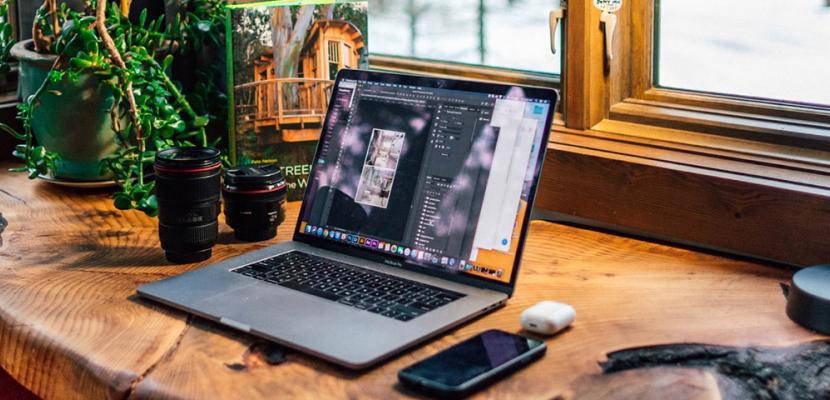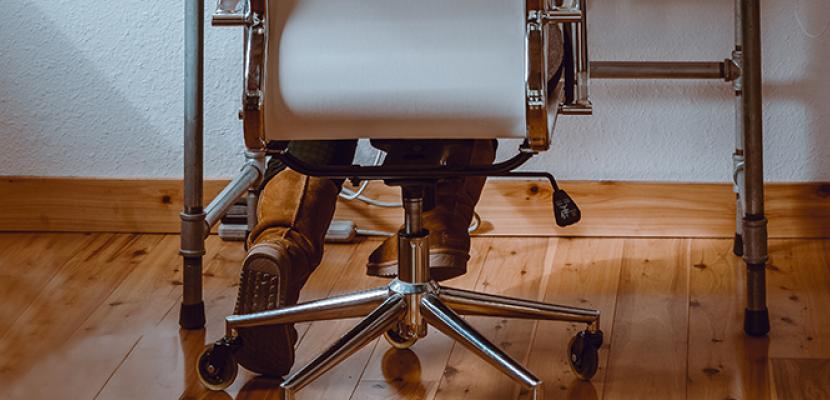
In 2020, we’ve spent more time at home than ever, with people around the world working, studying and socialising from their living rooms, bedrooms or dining tables.
With so many ways to work, is your set up affecting your health? There are a few simple steps you can take to ensure your workspace is set up correctly, avoiding niggles, soreness or fatigue.
We went straight to the experts – specifically, Assistant Professor of Occupational Therapy Michelle Fair – to find out how to best set up your study space.
1. Set up at a desk
While it can be tempting to lounge on your couch, beanbag or bed while you’re working from home, it’s unlikely to end well, says Michelle.
“You’re likely to end up with a sore neck, shoulders and back, as well as fatigue with your eyes as well,” she says.
Instead, opt for a study desk if you have one, or even a dining table.
2. Protect your posture
Poor posture is a big reason why you might experience pain or fatigue while studying.
“Often we see people hunched forward, with their chin poking out, arms not in a relaxed position, and the hips, knees and ankles unsupported,” says Michelle.
“This means the way you’re sitting isn’t supporting good posture, which can result in you developing musculoskeletal conditions.”
Ensure both feet are flat and supported on the floor (if you’re crossing them as you read this, uncross them now!) and your chair is close enough to your desk to ensure you’re not reaching too far forward to use your keyboard.
3. Use an appropriate chair
Professionals like Michelle agree the ideal chair is a ‘task chair’, also known as an office chair. Task chairs have a five-point castor base so you can slide your chair close to and away from your desk comfortably, with the ability to adjust the height, seat tilt and back rest. They also typically have lumbar support and a ‘waterfall edge’, relieving any pressure behind your knees.
However, if you only have access to a stationary, four-legged chair (like a dining chair), remember to position yourself as best you can, ensuring you move around as often as possible.
4. Get your monitor height right
Another part of ensuring good posture is making sure your computer monitor is at the right height for you.
You don’t always need to invest in fancy footrests or expensive equipment to protect your posture. Michelle says household items can often be used to set up your space in a way that is best for your posture.
“You can place a few books under your laptop to raise your monitor, or even get creative with a basket or box from around the house,” she says.
Whatever you’re using, make sure your laptop or computer screen is directly in front of you and with the top of the screen at eye level.

5. Get a separate keyboard and mouse
If you’re using a laptop, invest in a separate keyboard and mouse. If your laptop is elevated to eye level, you’ll need an extra keyboard and mouse to be able to relax your forearms while you’re typing.
Try to keep the keyboard as flat as possible and ensure your wrists are in a neutral position, with your forearms resting on the desk in front of you (or if you’re a touch typist, floating above the desk).
6. Think about your lighting
Lighting is one of the most overlooked elements of a home workspace, says Michelle, but it plays an important part to your overall health.
“Glare from a computer monitor can cause difficulties seeing, fatigue your eyes, and result in headaches,” she says.
“We often lean forward as our eyes become more tired, causing more stress in our neck and shoulders.”
If you can’t find a space away from windows, keep your screen at a 90-degree angle to the window to reduce the glare.
7. Move as often as possible
“Our bodies are designed to move; we aren’t supposed to stay sitting all day,” says Michelle.
Keep your body moving throughout the day by taking regular breaks and re-adjusting your position when you return to your seat.
Occupational Therapy at Bond
OT students are learning how to make a difference in the lives of others every day at Bond. Learn more about studying Occupational Therapy.